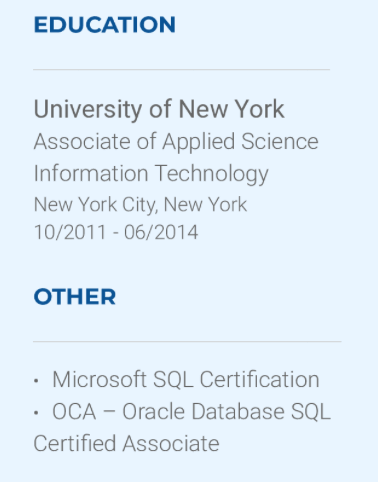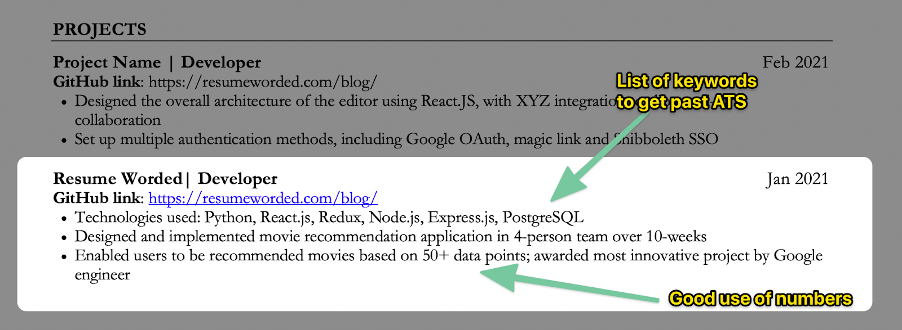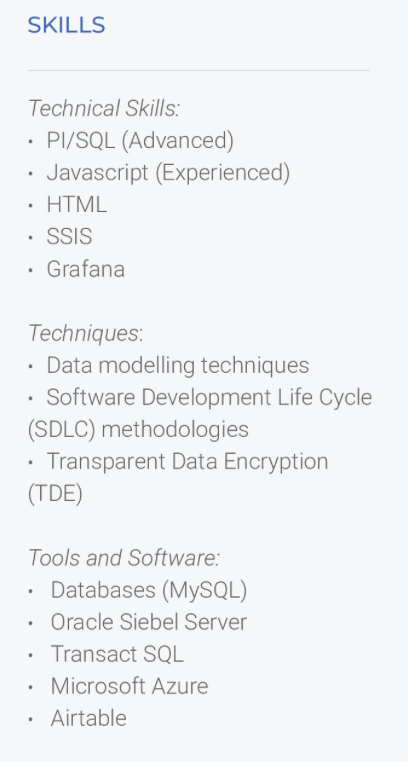Looking for a job that involves SQL? Tech jobs may be harder to come by than they used to be, but that doesn’t mean you should give up. The trick is to let your skills take the spotlight on your resume — and not just by stuffing every variation of “SQL” or “databases” you can think of on there.
Keep reading for tips and examples covering:
- Quick steps to listing SQL experience on your resume
- How to breakdown and evaluate your SQL expertise
- Where to put SQL on your resume
- Specific SQL skills and certifications worth listing
- Bullet point examples highlighting technical accomplishments
How to include SQL on your resume
- Write down your SQL experience. Brainstorm or make a list of your technical skills, certifications, projects, relevant work experience, and accomplishments.
- Now, think about how that list lines up with the job you want. Take a look at the job description and think about how you can tailor your experience to match.
- If you have any relevant professional experience, start with the Work Experience section of your resume. Include the company you worked for, your job title, dates of employment, and 3-6 bullet points underneath each role.
- List any relevant degree(s) in your Education section. This should generally go underneath your Work Experience section, but if you’re a recent graduate or career changer, you can put it at the top of your resume instead.
- Include any additional SQL or technical certifications. These can go in their own Certifications section or in your Education section.
- Highlight personal or educational projects where you used SQL in a Projects section. This is optional — the less professional experience you have, the more important projects become.
- List SQL and related skills in a Skills section at the bottom of your resume.
- Once you’re finished, run your resume through a free resume checker for personalized feedback on anything you may have missed and additional tips on how to optimize your SQL resume.
Evaluating your SQL experience
Before you put anything down on paper, you’ll need a list of your own skills and experience. You should consider:
- Level of expertise. Do you consider yourself beginner, intermediate, advanced, or expert? You don’t need to put your skill level on your resume, but make sure you’re aligning your experience with the types of jobs you’re applying for.
- Specific SQL technologies. Make a list of the ones you’re proficient in and could use in a professional setting. If you’re familiar with a technology but don’t feel confident using it at work, it’s best to leave it off your resume.
- Breadth of experience. How have you used your SQL knowledge? Write down the context — for example, full-stack development, data analysis, data warehousing, etc. The more specific you can get with this, the better.
Showcasing SQL experience on a resume
SQL expertise doesn’t just belong in one place on your resume. Instead, try to showcase it throughout, in sections like your:
- Resume header
- Work experience
- Education
- Certifications
- Projects
- Skills
- Additional information
Here are some examples of what that should look like, with tips on how to replicate them.
Putting SQL in your resume title
You don’t always need a resume title, but it’s a quick and easy way of highlighting SQL experience — and getting past any resume scanners that may be looking out for specific keywords. Simply list the title of the job you’re applying to in your resume header, right below your name and above your contact details. Here’s an example:

Work experience accomplishments involving SQL
Why can’t you just list your skills and certifications and call it a day? Because hiring managers want to know what you’re capable of in an actual work environment, not just what it says on a piece of paper. The best way to prove what you can do is to include examples of what you’ve already done, so think about:
- What task or project(s) you worked on
- Your specific role and what you did
- The end result
- Any quantifiable metrics, including the number of projects you completed, how much money you saved, or how quickly you got things done.
Here are some resume-ready examples of technical accomplishments:
Compiled scripts to automate weekly software updates, which helped save 10+ programmer hours every month ($5400 per head).
Conceived and developed indexes to reduce processing times from 45 minutes to 53 seconds in the first month of joining the team.
Performed SQL, PL/SQL, and application tuning using multiple tools, including EXPLAIN PLAN, SQL*TRACE, TKProf, and AutoTrace.
And here’s what it should look like on your resume:

I’d recommend uploading your resume to the tool below to check if you have highlighted your SQL experience and expertise the right way and included it in the most appropriate section of your resume.
Technical degrees and certifications
SQL certifications can go in a few different sections of your resume, including:
- Your Education section (if you have a degree in IT or a related field)
- A separate Certifications section (if you want to list multiple certifications and/or make sure they stand out at a glance)
- An Additional Information section (if you only have one of two certifications and want to list them briefly without taking up a lot of space)
Here’s an example of listing SQL certifications and technical degrees on a resume:

Relevant SQL certifications to put on your resume include:
- Oracle Certified Professional, MySQL Database Administrator
- MySQL Certified Implementation Specialist
- MySQL Database Developer Oracle Certified Professional
- Microsoft Certified: Azure Data Engineer Associate
- MTA: Database Fundamentals
- Cloudera Certified Data Analyst
- SAS Certified Big Data Professional
- IBM Certified Database Associate
- EDB PostgreSQL 12 Associate Certification
Further Reading: The Right Way To List Certifications on a Resume (With Examples)
SQL-based projects
If you don’t have a lot of work-based accomplishments, the next best thing is to include one or two examples of personal or academic projects where you used SQL and other technical skills. List the name of the project, the date, your role, and 1-3 accomplishments, including specific tools or software you used. If you have one, include a link to your GitHub profile either in your Projects section or your resume header.
Here’s an example of what that should look like:

Further Reading: How to List Projects on a Resume
SQL skills for your resume
The good news about technical skills is that it’s okay to list them directly on your resume. Make sure you comb the job posting for “must have” skills, since these are the keywords recruiters will be scanning for. You can also use tools like our skills and keywords finder to search for the most in-demand hard skills for a particular industry or job title.
For most jobs that involve SQL, you should be listing skills like:
- MySQL
- PL/SQL
- SQL Server Integration Services (SSIS)
- Javascript
- HTML
- C#
- Unix
- Shell
- Python
- Tableau
- Oracle Database
- Microsoft Azure
- Airtable
- SQL Server Management Studio
- Software Development Life Cycle (SDLC)
- Transparent Data Encryption (TDE)
- Database Design
- Data Modeling
- Database Architecture
- T-SQL Stored Procedures
- Code Encryption
- Data Warehousing
- Extract, Transform, Load (ETL)
Instead of overloading your resume with every vaguely related skill you can think of, aim for 5-10 skills in total. These should include the skills that are most essential to the specific job you’re applying for or — if you aren’t certain — the skills you most excel at.
To make your Skills section easier to skim, you may want to consider separating your skills into discrete subheadings, like “technical skills,” “techniques,” “tools,” “software,” and “certifications.” Here’s an example:

If you’re unsure which of your technical skills to include on your resume, use the skills search tool below to get a list of keywords and technical skills relevant to the job you’re applying for.
Other SQL accomplishments to include on your resume
You can also use a short Additional Information section at the end of your resume to showcase anything that doesn’t fit neatly into one of the sections above. This could include volunteer work, awards, tech publications, conference presentations, or membership in professional associations. Here’s an example of what that could look like on your resume:

SQL resume example
Ready to put it all together? You can write a resume from scratch or, if you’re short on time, jump right in with a ready-made ATS resume template like this one:
You can download this template and 11 others from our SQL developer resume examples page.










